13 October 2025
As a company, we are committed to ensuring that sustainability is a consideration in everything we do. When organising our Workshops, we are always looking for new ways to minimise our environmental impact. Sustainable events require a well-thought-out strategy and collaboration with the right stakeholders. We actively seek partnerships with suppliers that we can work with to deliberately choose sustainable options and to ensure that services and products meet our sustainable goals. This isn’t always a straightforward process. It requires constant searches for criteria matching, data analysis, grading and a fair amount of trial and error.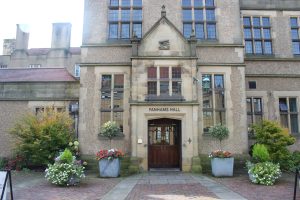
Last year, our Workshop ‘Roles of Lipids in Nuclear Homeostasis and Genome Stability’ gave us an opportunity to trial an event venue that has sustainable accreditations for the first time. We held our Workshop at Fanhams Hall, a sustainable-certified venue and accommodation and we were pleased by the widely positive impact it had in multiple areas.
“We were first accredited with our B Corp status in 2021. The framework was to reduce, recycle and reuse, to carry out due diligence on our supply chain, to focus on the local impact that we have within our community, to consider how we stack up in terms of our equality and inclusion, and to plan how we can better carbon roadmap our carbon emissions,” states Jonathan Edwards, General Manager, Fanhams Hall, UK.
All these considerations lined up with our Company’s sustainability goals and contributed to the event’s success.
How it helped the Workshop’s logistic organisers
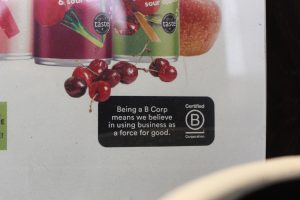
While the scientific organisers take care of the scientific content of the Workshop, we take charge of the logistic organisation. Overall, the venue’s sustainable strategies reflected positively throughout our event. We ran this Workshop with a reduced carbon footprint by hosting this event in Fanhams Hall, which prioritises renewable sources of electricity, minimises gas usage overall and has replaced fluorescent lights with LEDs. Since energy is one of the most crucial aspects in determining the sustainability of a venue, we prioritise venues that maximise renewable energy usage and encourage behavioural changes to minimise energy wastage. Fanhams Hall are also mapping their land in order to use the space as efficiently as possible for tree planting and to maximise carbon sequestration in these future trees, with an aim to become carbon positive by 2027.
The venue has banned all single-use plastic and replaced it with alternatives that cause less pollution. For example, tea bags and plastic milk pots were replaced with plastic-free alternatives during our Workshop. Furthermore, all leftover food that was suitable for consumption was redistributed to feed those in need from the local community. All their menus are seasonal; maximising local resources while minimising the carbon footprint generated by an ingredient’s import and transportation. These practices are pivotal to encourage a transition to a circular economy and to preserve raw resources, as well as to make further positive social impact.
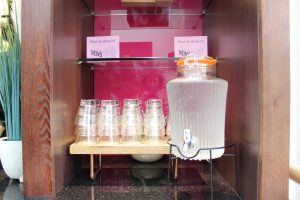
As organisers, we aim to make a difference through the choices that are in our power when planning an event. However, the supply chain brings the largest environmental burden and, as customers, we depend on the decisions that suppliers make. We have learned how important it is to channel our efforts into finding transparent suppliers that have the same environmental concerns as us and trust that they will make responsible choices with their own suppliers.
“Just like you investigated possible sustainable venues for your event, we do the same when we’re looking for suppliers and we gravitate to B Corp accredited ones.”
Jonathan Edwards – General Manager, Fanhams Hall
While we acknowledge that sustainability can be intimidating for a budget, this is not always the case. Many times, being sustainable means being more efficient with your resources, helping to achieve both your economic and environmental goals. Check out our guide to learn more on how to choose a sustainable venue.
What it meant for Workshop participants
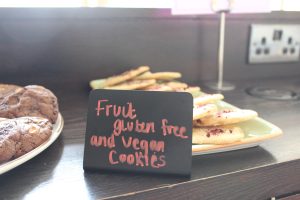
Participants enjoyed our Workshop without feeling that sustainability was an impediment in creating an unforgettable experience.
“Sustainability wise, I think this Workshop has done great work, which, to be honest, I haven’t seen in many events before. […]. So, I appreciate how everything was run. When it comes to sustainability, less is more.”
Sonakshi Gehlot – PhD candidate, University of Southampton
Based on participants’ feedback, the sustainable measures blended well with the Workshop, creating a space where scientists at various stages of their career could connect and exchange scientific information with a lower impact on our environment.
As Sonakshi noted, “I really find [the Workshop] fascinating […] because I come from a field which is very niche. I have been a scientist for seven years and I haven’t, until today, seen any nuclear lipid signalling conference. This is […] a first initiative bringing people from across the world to talk about these lipids.”
Room for improvement
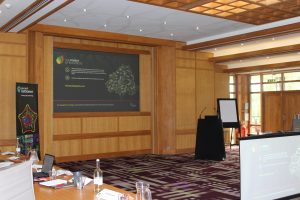 Feedback has always played a crucial role to enable us to provide high-quality sustainable events. Getting feedback from diverse points of view gives us the opportunity to reinvent and deliver future events with an even stronger sustainable strategy. For example, the Workshop scientific organisers had great ideas about communicating sustainability expectations.
Feedback has always played a crucial role to enable us to provide high-quality sustainable events. Getting feedback from diverse points of view gives us the opportunity to reinvent and deliver future events with an even stronger sustainable strategy. For example, the Workshop scientific organisers had great ideas about communicating sustainability expectations.
For example, “coffee breaks should instead be called breaks. They don’t need to come with coffee. This would reduce a lot of air miles that come from transporting coffee. […] So, sustainability is, you see, about breaking the standards,” noted Aurélia Lewis, University of Bergen, Norway and María Moriel-Carretero, Center of Research in Cell Biology of Montpellier, France, the scientific organisers.
We always welcome suggestions like this and hope to continue to break free from unsustainable standard conventions. The scientific organisers also noticed some aspects where the venue could improve, which we happily communicated to them. To win in sustainability, it is essential to work together to fill in the gaps.








You must be logged in to post a comment.